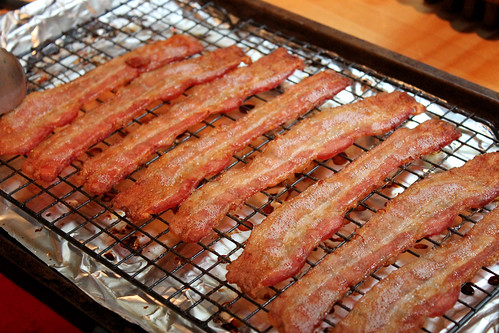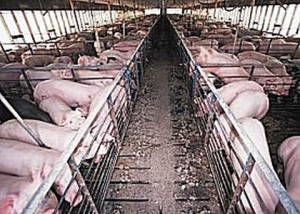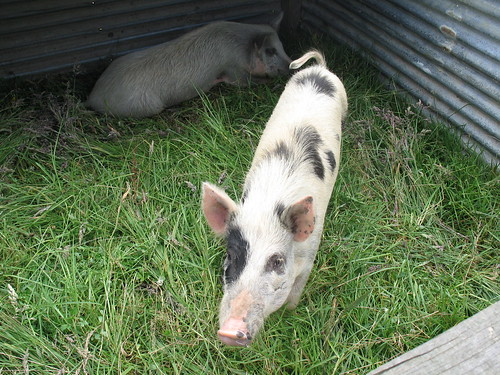 The drought that ravaged much of North American agriculture this past summer also proved devastating to food production in Russia. The worldwide impact of the widespread drought on the supply and cost of animal feed is so severe that the UK National Pig Association (NPA) emphatically declared this week that:
The drought that ravaged much of North American agriculture this past summer also proved devastating to food production in Russia. The worldwide impact of the widespread drought on the supply and cost of animal feed is so severe that the UK National Pig Association (NPA) emphatically declared this week that:
“A world shortage of pork and bacon next year is now unavoidable”
Gulp.
Some farmers have been getting by feeding candy to their animals instead of feed while others have responded by paring their herds.
The NPA notes that the paring of herds by many pig farmers will likely cause the number of animals available for bacon production to drop by 10 percent during the second half of 2013 causing the price of those sizzling strips to double.
 Dave Warner, spokesman for the National Pork Producers Council in the United States doesn’t seem nearly as concerned. He says that while paring of herds is definitely happening in the States, it’s not nearly as widespread as in Europe.
Dave Warner, spokesman for the National Pork Producers Council in the United States doesn’t seem nearly as concerned. He says that while paring of herds is definitely happening in the States, it’s not nearly as widespread as in Europe.
Steve Meyer, a consultant to the pork industry, agrees that bacon prices will probably be under pressure in the US as hog farmers will be reducing their herds by around 3% or so through next spring. Mr. Meyer went on to say that bacon in the UK and in the US is completely different, however, and unlike other countries like Australia which imports as much as 70% of its bacon, the United States does not import any bacon at all.
Wait a minute! Does this mean that when you buy “Canadian bacon” in the United States, it’s not really from Canada?
Guess so.
While it is still too soon to say whether an actual bacon shortage will materialize in the US like is expected in Europe, prices are indeed predicted to rise. Steve Meyer said he wouldn’t be at all surprised to see bacon prices around the $3.70 mark per pound sometime next year. According to the USDA, prices last month hovered around $3.53/lb with $3.56/lb the all time record set back in 2011.
While some consumers are tweeting their dismay at dwindling bacon supplies with some even saying that “the Mayans were right, this is how it’s going down”, others are yawning at the entire affair and feel quite secure in their pork and bacon supplies.

Why so?
These smart consumers buy pastured pork and bacon from small family farms which have not experienced nearly the same devastation from the drought as the conventional hog industry.
Perhaps it’s time to get to know your local pastured poultry farmers before the bacon apocalypse of 2013 strikes.
Sarah, The Healthy Home Economist
Sources: Bacon Shortage Worldwide “Unavoidable” UK Pig Group Says








Our local farmer who raises his pigs on pasture is cutting back this year. The drought has affected things so much that he needs what water he can get to grow grass for the cows (for raw milk shares) and also hay for part of their winter feed (we get snow and there isn’t much growing grass during the winter!). There isn’t enough water to grow pasture for the pigs so he’s not going to have many/any for next year at all. He’s also butchering his steer earlier this year since he can’t afford to raise them any long with the cost/lack of water. Unfortunately, we can’t afford to buy any of the pork meat so we just do without.
Our local farmer is in the same position, they had to start feeding hay over the summer because the grass dried up and the hay is costing more and more, they are trying to be creative though and are raising money to make a creamery out of an old trailer so they can have a value-added product- yogurt. So the drought has affected a lot of farmers.
Our local raw milk farmer here in Omaha, lost several pastured pigs one day when it got too hot, very sad! Pigs can’t take the heat without being able to get in the mud, and I guess they didn’t have access this particular day.
If the pigs can’t take the heat – they should get out of the kitchen! 😀 (this is national joke day isn’t it?) The reason low fat, lean bacon costs more is because the farmers have to buy tread mills and workout clothes for the pigs…
And the one and almost only meat I eat …..let it be bacon!
Hmm, wow. Up here (Canada) we pay $5.99 to $9.99 per pound of bacon (the higher-priced one is more pastured/natural), and many truly pastured bacons are even more expensive!! It’s a luxury for us, but I try to get a little every week since we love it so much and use it to flavour other dishes. I wonder if we’ll have a shortage up here next year.
Sarah – I’ve been wondering about this. But I question why pastured pork isn’t affected. Is it because pastured pigs depend less on industrial agriculture crops, like corn, which grown almost entirely in drought-affected “corn belt” region of the country? I was under the impression that pastured pigs still need a fair bit of supplemental feed, unlike grazing cows, which can survive on pasture plants alone. I think I got that idea on a tour of Polyface Farm a while back. What is this supplemental feed made from and where is it grown? Furthermore, weren’t the plants on their pastures also affected by the drought? Or is your article only referring to animals that are raised in those parts of the country that weren’t affected by drought?
Bingo!. If a pastured pig farmer wasn’t affect by drought, then they weren’t in the drought. We didn’t raise pigs this year because there was only dry, brittle stems and the trees we cut to get by. There certainly wasn’t any extra milk to feed pigs. You have to be careful where you get your “pastured” pigs. Most of them are raised identically feed wise to commercial pigs…just outside.
Just buy turkey bacon. ;0)
Turkey bacon???… MAKE IT GO AWAY!!!!
Ewwwww yes make it go away!
Only thing worse than Turkey bacon is Soy Bacon! A heartfelt YUCK to both of them!
Beef bacon is awesome!
Sarah, “Canadian” bacon, as I am quite sure you know, is not from Canada (gasp! shock!). It’s a style of bacon (thin round pieces) different from the typical American strips. This is not a surprise to most consumers and does not represent some marketing scam.
I’m pretty sure Sara was being sarcastic.
Yes, it was a joke!!! LOL
Actually, “Canadian bacon” refers to a cut, not that it’s imported.
I actually thought everyon knew Canandian bacon was a cut …..not imported from Canada. And the article stated we do not import bacon….although I wonder why with all the other imports of products that we have or could make right here in our own country.
Thanks for your perspective! I’ve been paying about $7/lb for bacon for several years now. GREAT bacon from a great source.
Why are we buying pork/bacon from the UK.? This is wrong!
There are plenty of family farms raising and selling pork.
Cathy
“Mr. Meyer went on to say that bacon in the UK and in the US is completely different, however, and unlike other countries like Australia which imports as much as 70% of its bacon, the United States does not import any bacon at all.”